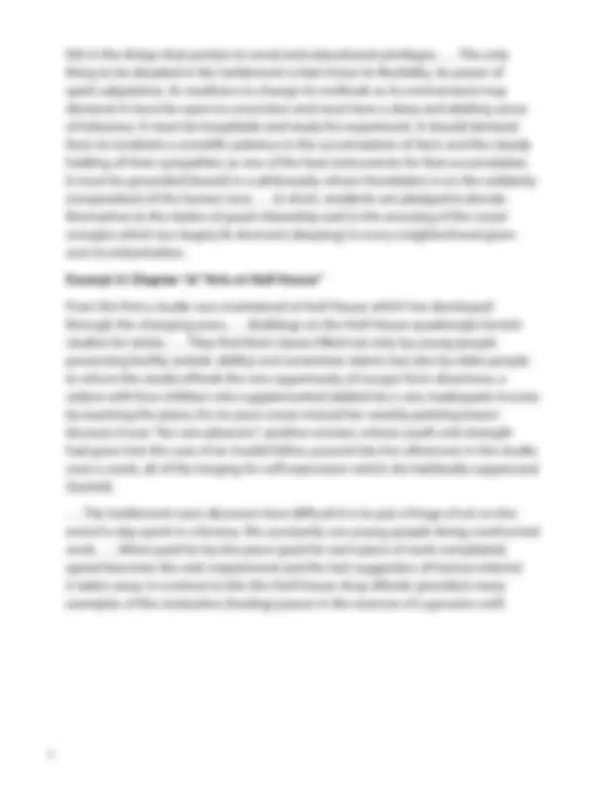



Study with the several resources on Docsity

Earn points by helping other students or get them with a premium plan


Prepare for your exams
Study with the several resources on Docsity

Earn points to download
Earn points by helping other students or get them with a premium plan
Community
Ask the community for help and clear up your study doubts
Discover the best universities in your country according to Docsity users
Free resources
Download our free guides on studying techniques, anxiety management strategies, and thesis advice from Docsity tutors
Jane addams' memoir, twenty years at hull house, recounts her experiences founding hull house, a settlement house aimed at helping immigrant families adapt to life in the us. The motivations behind the settlement movement, including the desire to make universal the blessings of refinement and education, and the renaissance of early christian humanitarianism. The text also highlights the importance of flexibility, experimentation, and tolerance in the settlement, as well as the role of arts in providing opportunities for self-expression and escape from poverty and drudgery.
What you will learn
Typology: Summaries
1 / 2

This page cannot be seen from the preview
Don't miss anything!


1 Nonfiction Excerpt 2: Excerpts from Twenty Years at Hull House by Jane Addams In 1889, Jane Addams founded Hull House, a settlement house meant to help immigrant families adapt to life in the United States. In 1910, Addams wrote a memoir about her experiences. In the memoir, called Twenty Years at Hull House, she recalled her own life and the poverty and abuses she sought to correct with her work. The memoir became Addams’s most successful book. Excerpt 1: Chapter 6, “Subjective Necessity for Social Settlements” This paper is an attempt to analyze the motives [reasons] which underlie a movement based, not only upon conviction [a strong belief], but upon genuine emotion, wherever educated young people are seeking an outlet for that sentiment for universal brotherhood [friendship]... I think it is hard for us to realize how seriously many of them are taking to the notion of human brotherhood, how eagerly they long to give tangible [concrete] expression to the democratic ideal. These young men and women, longing to socialize their democracy, are animated [motivated] by certain hopes... [they feel that] blessings which we associate with a life of refinement and cultivation can be made universal and must be made universal if they are to be permanent; that the good we secure for ourselves is precarious [unstable] and uncertain, is floating in mid-air, until it is secured for all of us and incorporated into our common life.... Other motives which I believe make toward [contribute to] the Settlement are the result of a certain renaissance going forward in Christianity. The impulse to share the lives of the poor, the desire to make social service.... I believe that this turning, this renaissance of the early Christian humanitarianism [caring for others], is going on in America, in Chicago, if you please, without leaders who write or philosophize, without much speaking, but with a bent [tendency] to express in social service and in terms of action the spirit of Christ. Certain it is that spiritual force is found in the Settlement movement.... Excerpt 2: Chapter 6, “Subjective Necessity for Social Settlements The Settlement then, is an experimental effort to aid in the solution of the social and industrial problems which are engendered [caused] by the modern conditions of life in a great city. It insists that these problems are not confined to any one portion of a city. It is an attempt to relieve, at the same time, the overaccumulation [having too much] at one end of society and the destitution [poverty] at the other; but it assumes that this overaccumulation and destitution is most sorely
2 felt in the things that pertain to social and educational privileges.... The only thing to be dreaded in the Settlement is that it lose its flexibility, its power of quick adaptation, its readiness to change its methods as its environment may demand. It must be open to conviction and must have a deep and abiding sense of tolerance. It must be hospitable and ready for experiment. It should demand from its residents a scientific patience in the accumulation of facts and the steady holding of their sympathies as one of the best instruments for that accumulation. It must be grounded [based] in a philosophy whose foundation is on the solidarity [cooperation] of the human race.... In short, residents are pledged to devote themselves to the duties of good citizenship and to the arousing of the social energies which too largely lie dormant [sleeping] in every neighborhood given over to industrialism. Excerpt 3: Chapter 16 “Arts at Hull House” From the first a studio was maintained at Hull-House which has developed through the changing years.... Buildings on the Hull-House quadrangle furnish studios for artists.... They find their classes filled not only by young people possessing facility [artistic ability] and sometimes talent, but also by older people to whom the studio affords the one opportunity of escape from dreariness; a widow with four children who supplemented [added to] a very inadequate income by teaching the piano, for six years never missed her weekly painting lesson because it was “her one pleasure”; another woman, whose youth and strength had gone into the care of an invalid father, poured into her afternoon in the studio once a week, all of the longing for self-expression which she habitually suppressed [buried].
... The Settlement soon discovers how difficult it is to put a fringe of art on the end of a day spent in a factory. We constantly see young people doing overhurried work.... When paid for by the piece [paid for each piece of work completed], speed becomes the sole requirement and the last suggestion of human interest is taken away. In contrast to this the Hull-House shop affords [provides] many examples of the restorative [healing] power in the exercise of a genuine craft.